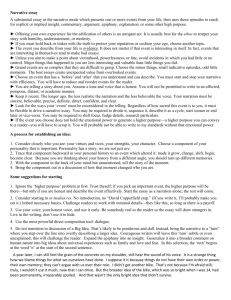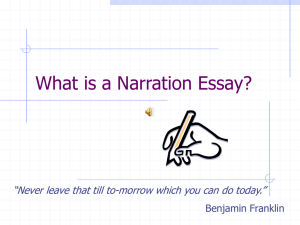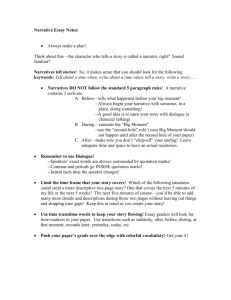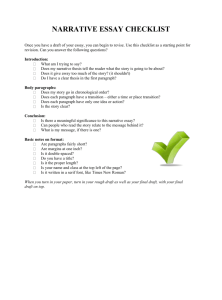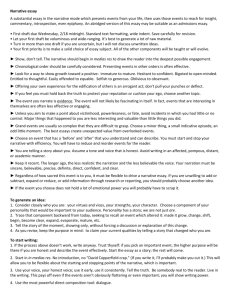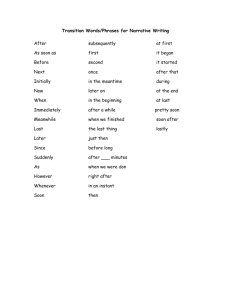Introductory Paragraph
advertisement
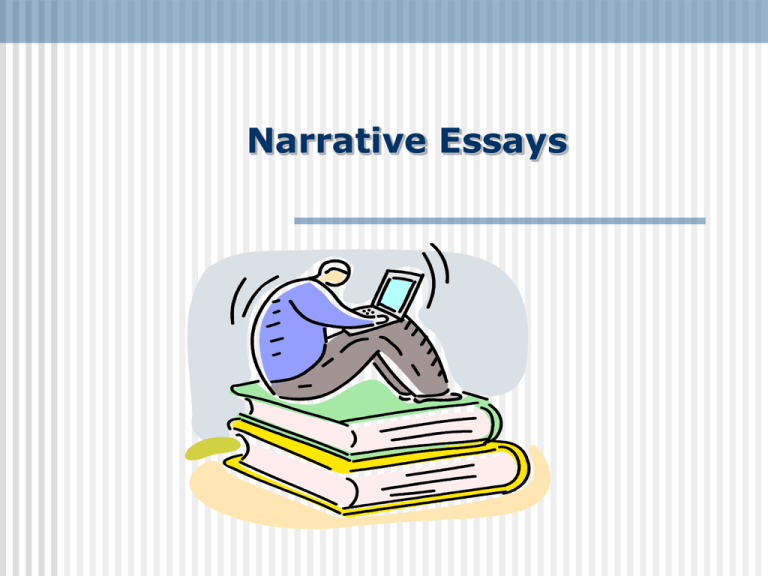
Narrative Essays WHAT IS A NARRATIVE ESSAY? Narratives tell stories. Everyone has read narratives, watched them on television or heard them from other people. A narrative paragraph tells a short story or describes an event. In other words, it is a story about a personal memory. It’s about a time so important that you don’t ever want to forget. What Would Make a Good Narrative and What Wouldn’t? Good Choice A house fire A car accident A death Getting lost A scary time Bad Choice Getting out of bed Eating dinner Meeting your friend A Personal Narrative is... a story that really happened ( a true story). a story that happened to or observed by the writer. a story that makes the reader think or feel the same as the writer felt at that time a story that shows strong feelings. a story that is written in the first person. Use these words: I, me, my, us, we A good Narration It reveals something of importance to you (your main point) It includes all of the major events of the story. It uses details to bring the story to life. It presents the events in a clear order, usually according to when it happened. Common time transitions Before After During First Next Second Then Finally while Later At last Last Eventually Meanwhile Since Now Soon when A UFO Sighting I never believed in aliens before one night last year. It was a cold, dark winter evening, and I was walking home from a friend’s house. I stopped to tie my shoe. When I looked up again, I saw a round object coming toward me. It was very large and shiny. I couldn’t believe what I was seeing. Before I could shout or run, the object suddenly moved and then disappeared. After the object disappeared, I ran all the way home and called my best friend. When she picked up the phone, I couldn’t say anything. I knew she would think I was crazy. I never told anyone about my UFO sighting. Ask yourself questions: 1. 2. 3. 4. 5. 6. 7. 8. 9. When was an important time in my life? What has happened in my experience that I would enjoy writing about? Is there an event in my life that other people would enjoy hearing about? How did I feel about a particular experience? Who was involved? Why do I remember this event so strongly? What effect did it have on me? Did anything change because of this experience? What interesting experiences do I know of that happened to other people? 1. Write about a recent experience or incident you witnessed that left a strong impression on you. 2. Write about an event when you were proud of someone in your family. 3. Think of a time when you had to do something against your wishes. Or 4. Think of a memorable experience you have had – it could be frightening or amusing. Activity: Complete the middle parts of the two stories below. 1) A Fright in the forest - Suddenly I felt very cold and scared. I grew up in a small town in the countryside. Near my house was a large forest, and my parents told me not to play there. After that day, I never went back to the forest. One day, I was playing in the forest with some of my school friends. - - 2)- A Strange Day in Class: - - I have been studying English for a few years and I really enjoy the classes. I heard everyone laughing. I woke up and realized it was a dream. One day something unusual happened in class. The teacher was explaining grammar when I saw something strange Writing a Narrative Essay: Organization Narrative essays are organized in chronological order. They tell a story in the order that the events happened. Like any other essay, the narrative essay should begin with an introductory paragraph, which will set up the events being related. This paragraph will be followed by a minimum of three body paragraphs. Always end your essay with a memorable and strong concluding paragraph. Always remember to stick to one point throughout the essay. Each paragraph should flow smoothly from one to another. What Should Be Included in a Narrative Essay? It is often written in 1st person – I or we – because it is based on a personal story It can also be written in 3rd person It can never be written in 2nd person It has specific sensory details to get the reader hooked on the story It is developed in chronological order It has verbs that help paint a picture and draw in the reader. What Else Does the Narrative Essay Need? Since this is a story, the narrative essay needs everything a story needs (these are known as the story elements): Has a plot Has characters Has a problem Has a climax Often uses dialogue Let’s Read the Essay – The Introduction It was a wonderful week to camp in the great outdoors, even if some of their friends thought it was a strange way to spend a vacation. Trudy and Jeff were looking forward to their week at Great Smoky Mountains National Park in Tennessee. Little did they know what a learning experience this trip would be. Oftentimes people do not follow simple directions. However, these campers learned just how important following directions can be. Setting the Scene of the Story After a scenic drive through the glorious mountains, Trudy and Jeff arrived at the camping area. A ranger at the booth handed them a map and asked, “Have you ever camped with us before?” “A better question would be if we ever camped before,” Jerry answered amusingly. “You’ll be fine. Just remember, this isn’t a hotel. We do have bears and other animals in the area, so lock your food up in the car,” said the ranger as he handed them a lists of Do’s and Don’ts. Developing the Plot Exhausted from their first attempt at setting up a campsite, Trudy and Jeff crawled inside the tent that evening, giggling and whispering to each other. They doused the light inside the tent and ignored the world outside. The ranger’s list was left laying on the tent floor. Continuing the Action – Vivid Word Choices Just before sunrise, Jerry was awakened by the sounds of metal ripping. He quietly slipped out of the tent. A fully grown black bear was sitting on their picnic table busily prying the lid off the cooler they neglected to store in the car the night before. Finding the pound of meat he prized, the bear leaned back on his hind haunches and began to devour the meat. Jerry started screaming at the bear, “Get out of here! What do you think you’re doing?” Reaching the Climax By this point, most of the other campers had exited their own tents and watched the scene unfold. The bear was not amused by Jerry’s threatening, especially with the remainder of the meat at stake. The black bear stood on top of the picnic table to his full height. While the bear actually stood only four feet tall, the extra height of the table caused him to loom over Jerry’s head. The bear suddenly fell forward, striking the table with his full weight and snarled. The table moaned in response. The Climax Continues Much more quickly than anyone anticipated, the bear reached out his huge, menacing paw towards Jerry. Fear leapt into Jerry’s eyes as he turned and ran back into his tent. Close the tent quickly! Now, one can only imagine how much time passed before Jerry and Trudy realized the futility of his preventive actions. How was a flimsy flap of cloth going to stop a full-sized, angry bear? Finding the Solution Fortunately, the bear was much more interested in the left-over meat than in Jerry and Trudy. The bear cautiously turned around, climbed back on top of the table, and continued to eat his early breakfast. He carefully examined the remaining contents of the cooler. Finding nothing else as delicious as the meat, the bear jumped off the picnic table, grunted, licked his paws and mouth, and then lumbered off into the deeper woods that surrounded the campground. The Concluding Paragraph The audience that had gathered applauded spontaneously, then slowly returned to their own campsites, shaking their heads in disbelief. Meanwhile, inside the thin tent, Trudy and Jeff had lit their lantern and were carefully studying the items listed on the Do’s and Don’ts list. The rest of their trip was blissfully peaceful as they made sure to follow all the rules at the campsite. Verb Tenses in Narration (1)- Simple Past: It is used to express a completed action at a definite time in the past. It is also used to describe the sequence of events in a narrative. 1.Mohammed was driving along the road when suddenly he saw a camel run out in front of him. He braked as hard as he could but couldn't stop in time. The car hit the camel. The man got out of the car and checked to see if the animal was alive. 2.The two men were crossing the desert when they heard a loud bang. It sounded like a rifle but they were not sure. They heard another shot but this time something hit the side of the car. Now they were sure it was a gunshot. Verb Tenses in Narration (2)- Past Continuous: (1) It is good for setting the scene; it is used to describe the situation in which the events of the narrative occurred. 1- When I woke up at 8am (1) the sun was shining (2) and the birds were singing (2). I had a shower (3), ate some breakfast (4) and left for work at 9am.(5) (2) It is used for an action that was in progress for some time and is usually used with an action in the simple past. 1. 2. 3. Mohammed was driving along the road when suddenly he ran out of petrol. As the two men were crossing the desert, they saw a camel. When the lights went out, I was talking to my brother. Verb Tenses in Narration (3)- Past Perfect Simple: It is to show an action or situation happened BEFORE another event in the past. 1. 2. 3. When I woke up at 8am (1), the sun was shining and the birds were singing. I had slept (2) really well the night before. I had a shower (3), ate some breakfast (4) and left for work at 9am. (5) The car was speeding down the deserted highway when the accident happened. The driver had fallen asleep at the wheel and driven straight into a tree. Another car passed by. The driver saw what had happened and stopped his car. He called the police and said that he had witnessed an accident. I woke up at 7am and left for work after I had had a shower and eaten some breakfast. Verb Tenses in Narration (4)- Past Perfect Continuous: It is used for longer activities that were happening continuously up until a specified time in the past. 1. He looked very tired (1) because he had been working very hard (2) over the past three weeks. 2. He hadn't heard the telephone ring because he had been reading. Activity 1: Change the verbs in brackets to the past tense: simple, continuous, or perfect 1. 2. 3. While I _______________________(play) football I_______(hurt) my leg. The police _____(go) to the bank after a neighbour ______(phone) to tell them what __________(happen). They soon ____________ (discover) that the robbers _____________ (escape) in a stolen car. The men _________ (kill) one of the guards who _________(try) to stop them as they _____________ (drive) away. The guard ______________ (jump) out in front of them but they just _________________ (run) over him. Suddenly they _________(hear) a strange noise and _______(look) at each other in terror. All evening they ___________ (play) cards and ____________ (watch) TV without thinking of the ghost. Activity 2: Change the verbs in brackets to the past tense: simple, continuous, or perfect The Unlucky Burglar One evening Paul (watch) ____________ the television and (eat)____________ his supper when the door suddenly (open) ____________ and a burglar (come) ____________ in. He (wear) ____________ a mask and (carry) ____________ a sack. Before doing anything else, he (tie) ____________ Paul to the chair. Then he went upstairs to look for money. Although he (not find) ____________ any money, he (find) ____________ a lot of jewelry, which he (put) ____________ into his sack. In his rush to get downstairs, he (not see) ____________ the dog that (lie) ____________ at the bottom of the stairs, and he (fall) ____________ over it, losing his glasses. ____________ the burglar (look for) ____________ them, Paul (try) ____________ to free himself. Finally, Paul (manage) ____________ to escape and he (phone) ____________ the police. When the burglar (find) ____________ his glasses, he (run) ____________ out of the house. However, unfortunately for him, the police (wait) ____________ for him at the end of the garden. Activity 3: Complete the following with a suitable past tense: 1. 2. 3. 4. 5. 6. 7. 8. My landlord threw me out of my flat because (not pay the rent for six months and break all the windows) When I eventually got to the meeting, I was bad tempered and exhausted! I (sit in traffic jam for 45 minutes, a motorist bump into me, and get completely lost) By the time 5 o'clock arrived, Brenda was furious. She (wait for an hour, drink six cups of tea, and they not arrive. I was so depressed that I couldn't do the exam. I (study every day for two months and give up see my friends) After I (finish) my lunch, I went back to work. When the police (interview) me, they let me go home. As soon as I got home my brother (go out). The children had to stay in until the rain (stop). Activity 4: Correct the mistakes with the simple past and the past continuous tense: When I am a university student about two years ago, I enrolled in a scuba diving course. My scuba diving teacher was having a big surprise: I wasn’t knowing how to swim. In fact, I had a big fear of water. When I was a child, my parents try to help me, so they make me take many swimming lessons. Although I try hard, I didn’t learning to swim. When I enrolled in the scuba diving course, I was still afraid of water. Everyday I entered the swimming pool, I battle my fear. Fortunately, my courage won every time. Finally, one day while I practicing my dive, I realized I was do very well. So, finally, after six months of hard work, I completed the course. It is true that I was always the worst of the group, but in my own evaluation, I was a champion because I conquer my fear of water. For me, this experience was very important. It was a test of courage, and I pass it.
